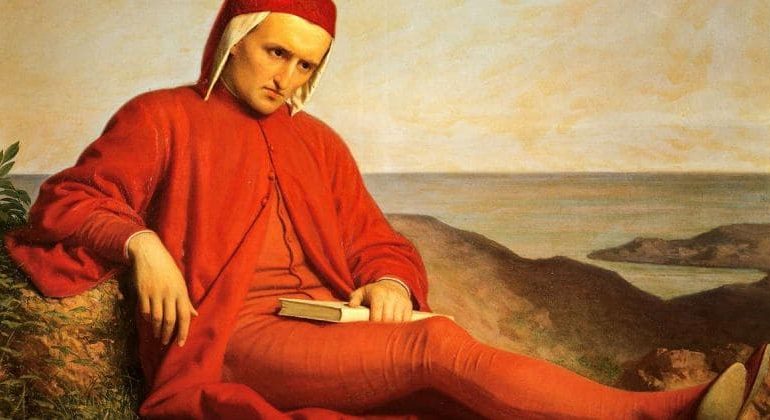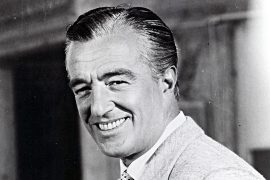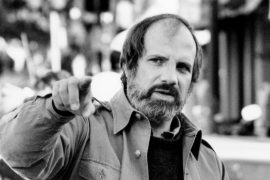There is hardly an Italian with a completed school education who does not know this first verse of the “Divina Commedia” (Divine Comedy), Dante’s main work. Not only because Dante is part of the standard program of Italian schools, but probably also because, in beautifully poetic words, he recalls the less poetic confusion and disorientation of the “mid-life crisis” that everyone probably goes through. But few still know how the Divine Comedy then continues, and in this respect Dante’s work shares the fate of Goethe’s “Faust”, which everyone in Germany knows – by name – but which only a few have read in its entirety.
Admittedly, both – Goethe’s “Faust” and Dante’s “Divine Comedy” – are not exactly easy to digest literature. Both draw extensively and confidently from the theology, philosophy and the sciences of the respective time. Without extensive accompanying commentary, Dante’s monumental work (more than 14,000 verses) is difficult to understand, and the fact that it is written in rhyme and in a chosen and no longer very modern language does not make matters any easier.
But the Divine Comedy is not only famous for its literary quality, it also represents a valuable reflection of the time and made a decisive contribution to the formation of the Italian language. For this latter reason, it has a similar meaning for Italian as Luther’s translation of the Bible has for German.
Today we know quite a lot about Dante’s life, but there are only a few direct sources, most of what is known about him has been derived from other sources, much also from the works of the poet himself. We don’t even know what he looked like us: all his portraits were painted long after he was dead, by artists who had never seen him. That’s why his slightly crooked nose, which one sees in all Dante’s portraits, is possibly just an invention of one painter, whom everyone else then copied.
Dante was born in Florence at the end of May or beginning of June 1265, where today you can also visit his birthplace (see photo above) – more precisely: his presumed birthplace. His family belonged to the wealthy city nobility, which determined and promoted Dante’s political career. The often bloody clashes between the Ghibellines and Guelphs (between the partisans of the emperor and those of the pope), which then tore apart the Italian city republics, were also to be of decisive importance for Dante’s life.
During Dante’s political tenure, events in Florence became increasingly turbulent, and the Ghibellines and Guelphs increasingly fragmented into many feuding factions. On the occasion of a visit by a papal legate, unrest broke out in Florence in the summer of 1300, which led to the excommunication of the city. In order to establish papal sovereignty over Florence and to incorporate Tuscany once and for all into the Papal States, Pope Nicholas IV called on Charles of Valois for military help. On November 1, 1301, Charles entered Florence and Dante’s house was probably destroyed during the acts of revenge of the troops loyal to the Pope. A little later, in January 1302, Dante was sentenced in absentia to a fine and to disqualification from all public offices. Because he stayed away from Florence, he was then condemned, along with other partisans, to be burned at the stake if he returned to the city.
Dante then lived in exile until his death in Ravenna in 1321, staying in many cities in central and northern Italy, most likely at the court of La Scala in Verona, in Treviso with Gerardo da Camina and from 1318 in Ravenna Guido Novello da Polenta. There are very few direct sources for the whereabouts of Dante at that time, so that today numerous towns and small towns in Italy, with more or less plausible explanations, insist that Dante visited at least once.
Dante’s hopes that Henry III, who was crowned Roman-German king in 1309 and then emperor three years later in Rome, could pacify the enemy factions in Italy and thus make his return to Florence possible, were not fulfilled. In 1315 Dante turned down an offer to return to Florence as it was conditional on payment of a fine and a public apology, whereupon the 1302 death sentence against him was renewed. During a stay in Venice in 1321 he fell ill and after returning to Ravenna he died there on September 14 of the same year.
In the centuries following Dante’s death, there were several violent disputes between Ravenna, where he is buried (see photo above) and Florence, which believed the poet’s proper burial place was in the Church of Santa Croce in Florence. A monumental tomb was erected there (see the second photo above), but it has remained empty to this day, since Ravenna understandably has no intention of having the famous body taken. Even in Dante year 2021, 700 years after the death of the famous poet, this rivalry can still be felt, no longer fiercely as it used to be, but more subliminal. After all, the anniversary celebrations are also a tourist magnet.
Dante’s “Divina Commedia”, which was written between 1307 and 1321, is the first major poem in the Italian language and is still considered her main work today. Actually, the verse epic is only called “comedy”, the adjective “divine” was later added by Dante admirer Giovanni Boccaccio. Not because the work is about God, but because he found it simply glorious, even more “divine.” Incidentally, the word “comedy” should not be understood in the modern sense of “comedy”, but simply as the opposite of “tragedy”, i.e. a literary invention that does not end with murder and manslaughter, but with a happy ending: the I- In the end, narrator Dante finds nothing less than the meaning of life.
Before he gets there, however, he has to undertake an adventurous journey through the afterlife. Accompanied by the Roman poet Virgil, who serves as his guide, Dante first gets to hell (Inferno), then over the mountain of purification (Purgatorio) and finally to paradise (Paradiso), the high-altitude flight with the beloved childhood friend Beatrice. On the way there he meets hundreds of famous personalities from politics, literature and mythology who are waiting for salvation, with whom he talks and who tell the traveler about their lives. Hell and Paradise are each divided into nine concentric circles. The closer one gets to the narrower circles, the more sinful (in hell) or the holier (in paradise) are the deceased souls. Hell in particular, the most interesting part of the literary journey to the afterlife, is rich in contemporary criticism, which is occasionally quite sharp and is full of allusions to celebrities who were still alive in Dante’s time. The “Divine Comedy” has high ethical standards and holds up a merciless mirror to the reader, the political society and even the church of its time. At the end of his journey, in paradise, the poet finally recognizes the meaning of his existence in the love of God.
Dante worked on this work for 20 years. He wanted to surpass Virgil, the ancient poet, and present a picture of the world as a whole.
As already indicated above, one should not read this work today without a detailed commentary section, otherwise the reader of the 21st century will miss most of what the educated reader of the 14th century could understand without a commentary. And a little knowledge of the history of Dante’s time will certainly help to understand the “Divine Comedy” in all its literary scope today.
What did Dante Alighieri do?
DANTE ALIGHIERI is the most important Italian writer of the Middle Ages. His fame is mainly based on his three-part work “La Divina Commedia” (“The Divine Comedy”) and on his “Rime” on Beatrice “Il canzoniere”.
Who or what is Dante?
Dante is one of the most famous poets of Italian literature and of the European Middle Ages.
Why is Dante important?
Dante is considered the father of the Italian language. But why? In the fourteenth century there were several languages in Italy: the language of culture and literature was Latin, while the people spoke different vernaculars that did not yet form a unified language.
Why does Dante go to hell?
Merging Cicero’s violence with Aristotle’s bestiality and his deceit with malice or vice, Dante the poet was given three main categories of sin, symbolized by the three beasts Dante encounters in Canto I: these are lust, violence/bestiality and fraud/ …
What are the 7 circles of hell?
The really bad people can be found from the seventh circle onwards: violent criminals, suicides, blasphemers, fraudsters, thieves and traitors. Incidentally, all circles are occupied by all sorts of figures from Greco-Roman mythology and contemporary history.
Who ends up in hell?
Depending on the belief, it is thought of as a place of annihilation, purification or eternal damnation of the deceased. According to traditional ideas of Christianity, it is a place of torment where evildoers go after death, populated by demons and the devil.
Who wrote Dante’s Inferno?
Dante Alighieri
Where is Dante’s Inferno hanging?
In the meantime, Botticelli’s drawings had reached Great Britain. Botticelli’s surviving drawings for Dante’s comedy after an odyssey lasting centuries are now in the Kupferstichkabinett in Berlin and in the Vatican Apostolic Library.
What is Dante’s death mask?
The death mask, as the name suggests, appears to be a copy of Dante’s face made after his death, better known as the death mask. According to tradition, it seems to have been later carved after the image on Dante’s tomb, the remains of which are in Ravenna.
Why was Dante banished from House of Florence?
Dante, who found himself on the losing side in the Florentine power struggles of the time, had been accused of activities hostile to the state around 1302. Therefore, the author of the “Divine Comedy” was banned from Florence for two years and sentenced to a fine.
Which of the following statements about dante alighieri is true?
The statement that correctly describes Dante Alighieri is this: The modern Italian language was strongly influenced by his writings.
How long did dante alighieri live?
Dante, in full Dante Alighieri, (born c. May 21–June 20, 1265, Florence [Italy]—died September 13/14, 1321, Ravenna), Italian poet, prose writer, literary theorist, moral philosopher, and political thinker.





